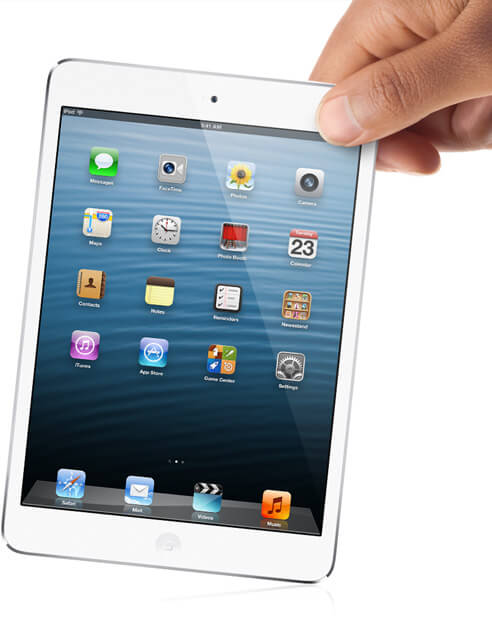While some may point to the iPhone 4S or iPhone 5, most historians agree that Apple’s fall from the top began in 2012 when, panicked by the success of rival tablets, they released the iPad Mini. While ultimately a bigger success than the full sized iPad in terms of sales, the Mini was widely panned by critics as a “me-too” mini tablet costing much more, while offering much less, than many of its 7-inch rivals. Their rivals leapfrogged them, and before long the world’s largest corporation was reduced to bankruptcy.
Will some future writer pen these words, or similar words, about the technology wars of our time? Perhaps not, but after yesterday it seems a lot more likely.
With the iPad Mini launch, Apple may well have jumped the shark and begun a spiraling decent into irrelevance. I say this not because they won’t sell millions, I think we’re all agreed they will, but most people would agree that, with its strong brand reputation, Apple could sell bottled water and millions would buy it and call it revolutionary (hydro-lutionary? aqua-lutionary?).
Yet Apple need only ask the many tech giants who have preceded them how long such a reputation can withstand market forces when innovation takes a back seat to iteration, litigation, and the bottom line.
More so than any other iDevice Apple has ever released, the iPad Mini was an overpriced me-too device, which costs considerably more than its top rivals the Nexus 7 and Kindle Fire HD for what amounts to nothing but recycled iPad 2 hardware in a not-so-mini mini tablet. That millions will likely sell isn’t a testament to the greatness of the product, but to the power of the brand. Brands, however, owe their greatness to great products, and when the products stop being great, the brand loyalty tends to fade over time.
The iPhone 4S was a minor iteration over the iPhone 4, but those iterations showed progress in the product line: better graphics, a better screen, a virtual assistant who didn’t quite live up to expectations, etc… The iPhone 5 was also iterative, but iteration is still advancement. Likewise with the “New” (now old) iPad: minor iterations, but worth the upgrade for many.
The iPad Mini not only isn’t revolutionary in any way, it isn’t even an iterative improvement on the iPad series, nor does it challenge opponents to step up their game (at most it challenges opponents to lower their prices further, a challenge they seem capable of meeting).
It was obvious during the launch that Apple was aware of its weaknesses, and like any good magician they practiced the art of misdirection, focusing on red herring issues like how that extra .9-inches of screen real estate mean a better browsing experience (because tapping or pinching to zoom is such an enormous hardship, apparently), or their subtle assertion that the Nexus 7 feels “cheap” and “plasticky” (which, outside the reality distortion field at least, is nowhere near true; sorry, Apple, but even professional fanboi MG Siegler doesn’t agree with you on that one).
Even Samsung wouldn’t try to make a selling point of having the biggest mini tablet out there… it’s a mini for a reason, after all! If anything even Apple must have known their “mini” wasn’t really very mini, how else to explain those ungodly narrow bezels in portrait mode? Those bezels are so narrow that, to borrow a Jobsianism, they make no sense for normal human hands unless it also comes with sandpaper to file down your fingers with.
Let me repeat: the iPad Mini will sell millions. It will probably outsell the larger iPad eventually. To someone who only sees quarterly revenue, all will seem well in Cupertino Town. But to someone with a longer view of the technology landscape, the death of a technology firm starts the minute innovation takes a back seat to profit. And that’s precisely what Apple has done, repackaging an old tablet into a smaller form factor.
If the iPad 2 still had any cutting edge features, this might not be so bad, but it doesn’t; not one single feature apart from its size sets the Mini apart from newer iPads or from more affordable, and more advanced, competitors. That it runs the latest version of iOS may be its only saving grace, but many would argue (rightfully so) that innovation in iOS has also slowed to a “me-too” level (not to mention the ).
The iPad Mini is a good choice for those who won’t buy any tablet but an iPad and want something smaller or more affordable, but even then you’re being cheated in a choice between the overall-better 4th generation iPad, an only slightly more expensive iPad 2, and a more advanced but much smaller and slightly cheaper new iPod Touch. Worse, the price increments go up $100 each time you double the memory, even though the actual cost of that increase is only a fraction of that.
If you want the most advanced mini tablet, buy a Nexus 7, buy a Kindle Fire HD, heck buy a Barnes & Noble Nook. All three companies are still trying to earn your patronage by giving you the best they can offer at the best price they can offer. Neither of which can be said for Apple. Apple thinks you’re a fool with (as my colleague Brian Hartman put it) “more money than sense”.
Most likely they’ll be vindicated in this belief, sadly, but take heart: Apple can fool some of the people all of the time, and all of the people some of the time, but they will never fool all of the people all of the time. Resting on their laurels may win them a few battles, but in the end will likely lose them the war.
